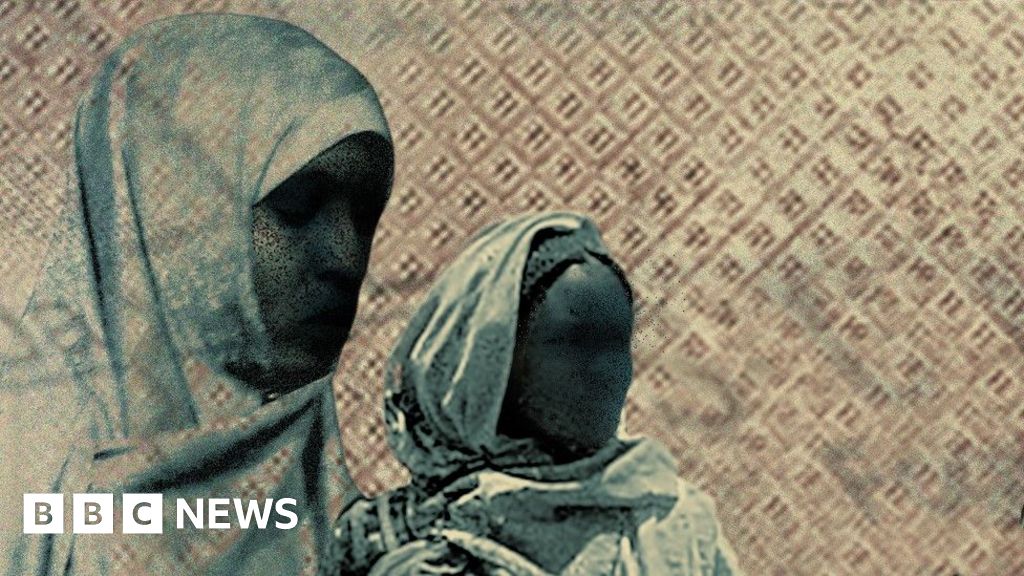ARTICLE AD BOX
By Secunder Kermani
BBC News, Kabul
Maulvi Fatih and his officials addressed shop keepers and members of the public who gathered at a Kabul mall
In their long white gowns, the inspectors of the Taliban's Ministry for the Prevention of Vice and Promotion of Virtue look more like food safety inspectors than "moral police".
But they're at the forefront of attempts to mould a new, more "Islamic" identity in Afghanistan, in keeping with the group's hard-line views.
Their role seems broad. During their last visit to a multi-storey shopping centre in Kabul a few months back, shopkeepers remembered the inspectors checking whether products were past their expiry date, as well as instructing them to remove posters featuring women's bodies.
Many of the images, however, still appeared to be up when the inspectors returned earlier this week, accompanied by the BBC.
Despite being the youngest in the group, a round-faced and bespectacled 25-year-old former madrassa student, Maulvi Mahmoud Fatih, led the way.
Addressing a crowd of male shopkeepers and bystanders that had been rustled up, he delivered a lecture on the importance of saying your prayers and growing a beard.
He spoke in the spirit of brotherly advice: "Keeping the beard is following the example of the Prophet Muhammad," he said, adding with a chuckle, that it has other "benefits" too.
"These clerics have two or three wives," he says, gesturing to his fellow inspectors. "It's a source of power."
Maulvi Fatih says his team are on the look-out for women not wearing veils but enforcement so far seems lax
He, and four colleagues, also offered to help solve any difficulties the onlookers were facing.
When one shopkeeper complained of a man, purporting to be from the Taliban, demanding free mobile phones, Maulvi Fatih wrote down his phone number and promised to investigate.
But it's the ministry's new decrees on what women should wear that have attracted the most attention - and criticism.
Earlier this month, it issued an edict that all women should wear a face veil in public. Any woman repeatedly not complying could see their male relative jailed or sent to court.
The topic did not feature in Maulvi Fatih's shopping centre lectures, however. When questioned as to why? He replied: "We are talking about men's issues to men."
As for the new dress code, he added, "we have spoken and advised the owner of the centre and put up posters too".
A small printout, stuck to a pillar by a staircase in the mall has two images illustrating how women should now dress - one is an all-encompassing blue burka, the other is a similar black outfit.
"Muslim women should follow the Islamic veil, this is the order of Sharia," reads the text.
Afghanistan is a conservative country and many women already wear the burka or other face veils. In cities like Kabul, however, others simply cover their hair with a scarf, with some relatively recently adding a Covid-style face mask too.
Women's rights activists inside and outside the country reacted with dismay to the new edict, which comes as nearly all teenage girls still haven't been allowed back to school and many female employees have been ordered not to return to their offices.
Years of fragile progress on women's rights looks to be unravelling.
Women in Afghanistan face an uncertain future following the Taliban's takeover
For the moment though, initial enforcement of the new rules on "hijab" seems relatively lax.
But many worry the Taliban will soon grow far stricter - female TV presenters have now been instructed to wear face coverings on air.
Around the city, it's still a common sight to see women with their faces uncovered, and many present at the shopping centre during the visit by the Vice and Virtue inspectors seemed unperturbed by their presence. Others, however, looked on with concern.
"We can distinguish between a woman who has a hijab and who doesn't," Maulvi Fatih tells the BBC. "If a woman is completely crossing the limits, without any modesty or veil, then we will try to find her male guardian."
So far, he says, that hasn't happened, though it's hard to pin down his definition of "crossing the limits" or conceive of what it could mean.
When questioned on what right the ministry has to dictate how Afghan women dress and interpret Islam, Maulvi Fatih replies: "It's not the decree of the ministry, it's the decree of God…
"The real cause of moral corruption is the face - if the face is not covered, then what's the point of hijab?"
Most Muslims across the world however do not believe a woman needs to cover her face.
The Vice and Virtue officials use a pick up truck to get around
The inspectors move on, travelling in the back of a pick-up truck to a bus stop.
Flagging down passing vehicles, they check to see whether men are too close to female passengers or if women are being made to stand up rather than being given seats.
The ministry has a notorious reputation, dating back to its role during the Taliban's first regime in the 1990s, when "offenders" would regularly be beaten.
Now, Maulvi Fatih tells us, the only punishment they're allowed to administer to bus drivers repeatedly disobeying their commands is to "take him to our office for one day and night… and advise him, letting him know these are the words of Allah and his messenger. We get a guarantee from him the next morning and let him go."
In front of us, the inspectors are polite and gentle with the public. Residents we speak to later on, away from the Taliban tell us they have no complaints about this team.
But it seems clear the Taliban are growing increasingly repressive.
Women's rights activist Leila Baseem was on board a bus stopped by Vice and Virtue officials shortly after the "hijab decree" was issued.
An inspector rapped on the back of the vehicle with a stick and stepped inside.
Leila Baseem says the rights of half of society are being taken away
"Two women were wearing burkas," Ms Baseem told the BBC. "The others, like me, had black gowns with surgical face masks… I told him, there is no one here without a hijab."
On hearing this, Ms Baseem said, "he went red with anger".
"He wouldn't look at me but said, 'you are a very shameless women. This is not the Afghan Republic, it's the Islamic Emirate now. You can't do what you want any more."
Ms Baseem, who has led small protests against the Taliban's closure of girls' secondary schools, said the inspector accused her of having worked for the "Americans" and now "wanting to live with American culture", before the bus driver beseeched her to not argue further.
Other drivers told the BBC they had been warned not to allow women with tight-fitting leggings on board, though they said, for now Vice and Virtue officials had not prevented women from travelling just for leaving their faces uncovered.
When the Taliban first seized power last August, they initially appeared to be adopting a more flexible attitude than many had feared, refraining from issuing new laws governing how society should function.
Vice and Virtue officials question a bus driver in Kabul
In recent months, however, there has been a clear hardening in their stance.
Despite an ongoing economic crisis, the Taliban's priority appears to be tightening social restrictions.
Other rules issued by the Ministry of Vice and Virtue include segregated days of the week for men and women to visit parks, barring women from making long-distance journeys alone.
The trajectory has left many Afghans nervous about what will happen next.
"They're starting softly, but I'm sure eventually they will end up exactly the same as they were in the 1990s," one businessman told the BBC, whilst contemplating whether he and his daughters had a future in the country.
Women's right activist Ms Baseem is even more pessimistic. "I'm sure if women accept the face veil the Taliban will come up with a new law, and order them to stay at home."
The Taliban's values do chime with some of those in conservative areas of Afghanistan, whilst there are orthodox clerics elsewhere in the Muslim world who also preach in favour of strict gender segregation. No other country, however, has the kind of restrictions on woman currently in place under the Taliban.
Vice and Virtue inspectors argue they are removing moral corruption from society. "What is moral corruption?" Ms Baseem responds. "It's when you take away the rights of half of society."

 2 years ago
99
2 years ago
99








 English (US) ·
English (US) ·